Puzzles offer a powerful way to calm your anxious mind and reduce stress. You'll find various options to suit your preferences, from classic jigsaw puzzles that promote mindfulness to number-based Sudoku for logical thinking. Crosswords can expand your vocabulary while providing a mental escape, while tangrams and 3D puzzles engage your spatial reasoning skills. For a meditative experience, try maze books or coloring puzzles. If you prefer digital solutions, many puzzle apps offer customizable difficulty levels and progress tracking. By incorporating these stress-busting puzzles into your routine, you'll discover new ways to find inner peace and sharpen your cognitive abilities.
The Science Behind Puzzle Therapy
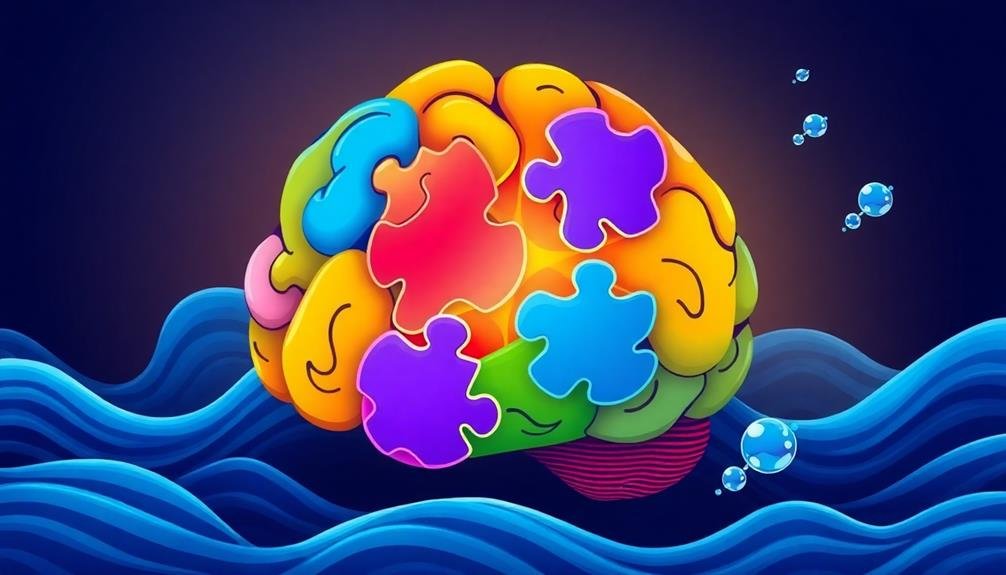
Tranquility often eludes us in our fast-paced world, but puzzle therapy offers a surprising solution. When you engage in puzzles, your brain enters a state of flow, focusing intently on the task at hand. This concentration shifts your mind away from stressors, providing a mental escape.
Puzzles activate multiple cognitive functions simultaneously. As you solve them, you're exercising problem-solving skills, visual-spatial reasoning, and working memory. This mental workout releases dopamine, a neurotransmitter associated with pleasure and reward, creating a natural mood boost.
Moreover, puzzle therapy taps into the brain's neuroplasticity, its ability to form new neural connections. Regular puzzle-solving can improve cognitive flexibility, enhancing your ability to adapt to stress in daily life. It's not just about distraction; it's about building mental resilience.
Research has shown that engaging in puzzles can lower cortisol levels, the hormone linked to stress. You're not just passing time; you're actively reducing physiological markers of anxiety.
Whether it's jigsaw puzzles, crosswords, or Sudoku, you're giving your brain a stress-reducing workout with every piece you place or number you fill in.
Jigsaw Puzzles for Mindful Focus
You'll find jigsaw puzzles to be an effective tool for piece-by-piece stress relief.
As you focus on fitting each piece into place, you're engaging in a form of immersive visual meditation.
This mindful activity can help quiet your racing thoughts and provide a calming respite from daily stressors.
Piece-by-piece Stress Relief
Jigsaw puzzles offer a unique way to piece together tranquility in your life. As you focus on fitting each piece into its rightful place, you'll find your mind gradually shifting away from daily stressors. This methodical process allows you to enter a state of flow, where time seems to slow down and worries fade into the background.
The act of completing a jigsaw puzzle provides a sense of accomplishment, boosting your mood and self-esteem. It's a tangible representation of progress, reminding you that even complex problems can be solved step by step.
Here's why jigsaw puzzles are effective stress-busters:
- They promote mindfulness and present-moment awareness
- They offer a meditative escape from digital distractions
- They improve problem-solving skills and cognitive function
- They can be enjoyed alone or as a social activity with friends and family
Choose puzzles with images that resonate with you, whether it's a serene landscape or a vibrant cityscape. Start with smaller puzzles and gradually work your way up to more challenging ones.
You'll soon find that the simple act of connecting pieces can help you disconnect from stress and reconnect with inner peace.
Immersive Visual Meditation
Beyond their role as entertainment, jigsaw puzzles serve as a gateway to immersive visual meditation. As you engage with the pieces, you're drawn into a state of focused calm. Your mind narrows its attention to the task at hand, pushing aside daily stressors and worries.
This meditative quality stems from the puzzle's ability to captivate your visual senses. You'll find yourself lost in the details of the image, examining colors, patterns, and shapes. This intense focus acts as a form of mindfulness practice, anchoring you to the present moment.
Here's how jigsaw puzzles compare to traditional meditation:
| Aspect | Jigsaw Puzzles | Traditional Meditation |
|---|---|---|
| Focus | Visual | Breath or mantra |
| Posture | Seated or standing | Usually seated |
| Duration | Flexible | Often timed |
| Environment | Any quiet space | Typically quiet room |
Sudoku: Numbers for Inner Calm

Pencil in hand, you're ready to tackle the numerical challenge of Sudoku. This Japanese logic-based puzzle offers a unique way to calm your mind and reduce stress. As you focus on filling the 9×9 grid with digits from 1 to 9, you'll find your worries fading into the background.
Sudoku's stress-busting benefits stem from its ability to engage your brain in a structured, methodical task. You'll experience:
- Improved concentration and mental focus
- A sense of accomplishment as you complete each puzzle
- Reduced anxiety through mindful engagement
- Enhanced problem-solving skills
As you progress, you'll discover various difficulty levels to match your skill and mood. Start with easier puzzles to build confidence, then gradually move to more challenging grids.
The beauty of Sudoku lies in its simplicity – no math skills required, just logic and patience.
You'll find Sudoku puzzles in newspapers, dedicated puzzle books, or mobile apps. Choose your preferred format and make it a daily ritual. By immersing yourself in the world of numbers and patterns, you're creating a peaceful oasis in your busy day, one square at a time.
Crosswords: Vocabulary Stress Relief
When you're feeling overwhelmed, try tackling a crossword puzzle to engage your mind and expand your vocabulary.
You'll find yourself absorbed in the clues, temporarily forgetting your worries as you search for the perfect word to fit each space.
Crosswords can also be a great way to connect with others, whether you're solving together or comparing notes on particularly tricky clues.
Vocabulary Building Challenge
Crossword puzzles offer a brain-boosting way to relieve stress while expanding your vocabulary. As you tackle each clue, you're not only distracting yourself from daily worries but also enhancing your language skills. Challenge yourself to learn new words with each puzzle you complete, and you'll soon find your vocabulary growing exponentially.
To maximize your vocabulary-building experience, try these strategies:
- Use context clues to guess unfamiliar words
- Look up definitions for words you don't know
- Create mnemonics to remember new terms
- Incorporate newly learned words into your daily conversations
Don't be discouraged if you encounter difficult clues or unfamiliar terms. The beauty of crosswords lies in their ability to push your linguistic boundaries.
Start with easier puzzles and gradually work your way up to more challenging ones. You'll be amazed at how quickly your word knowledge expands.
Mental Distraction Technique
Beyond expanding your vocabulary, crossword puzzles serve as an effective mental distraction technique for stress relief. When you're feeling overwhelmed, immersing yourself in a crossword puzzle can redirect your focus away from stressors and onto the task at hand. This mental shift helps break the cycle of anxious thoughts and provides a temporary escape from worries.
As you engage with clues and search for answers, your brain becomes fully occupied, leaving little room for stress-inducing thoughts. The process of solving each clue requires concentration and analytical thinking, which naturally draws your attention away from external pressures. You'll find that the more challenging the puzzle, the more effectively it absorbs your mental energy.
Crosswords also offer a sense of accomplishment as you complete each section, boosting your confidence and reducing stress levels. The act of filling in blank spaces with correct answers triggers a release of dopamine, the brain's feel-good chemical. This positive reinforcement can improve your mood and help you approach stressful situations with a clearer mind.
Social Interaction Opportunity
Puzzle enthusiasts often find that crosswords provide more than just a solitary pastime. They're an excellent opportunity for social interaction, offering a unique way to connect with others while exercising your brain.
You'll discover that sharing crossword puzzles can spark conversations, foster teamwork, and create lasting bonds.
When you engage in crosswords with friends or family, you're not just solving clues; you're building relationships. Here's how crosswords can enhance your social life:
- Organize crossword parties or game nights
- Join local crossword clubs or online communities
- Collaborate with colleagues during lunch breaks
- Bond with family members over Sunday puzzles
As you work together on challenging clues, you'll find yourself exchanging knowledge, sharing laughs, and creating shared memories.
Crosswords can bridge generational gaps, allowing grandparents to connect with grandchildren over wordplay and trivia. They're also great icebreakers in social settings, helping you find common ground with new acquaintances.
Don't underestimate the power of crosswords as a social tool. By turning puzzle-solving into a group activity, you'll not only reduce stress but also strengthen your social connections and improve your overall well-being.
Tangrams: Shapes to Soothe
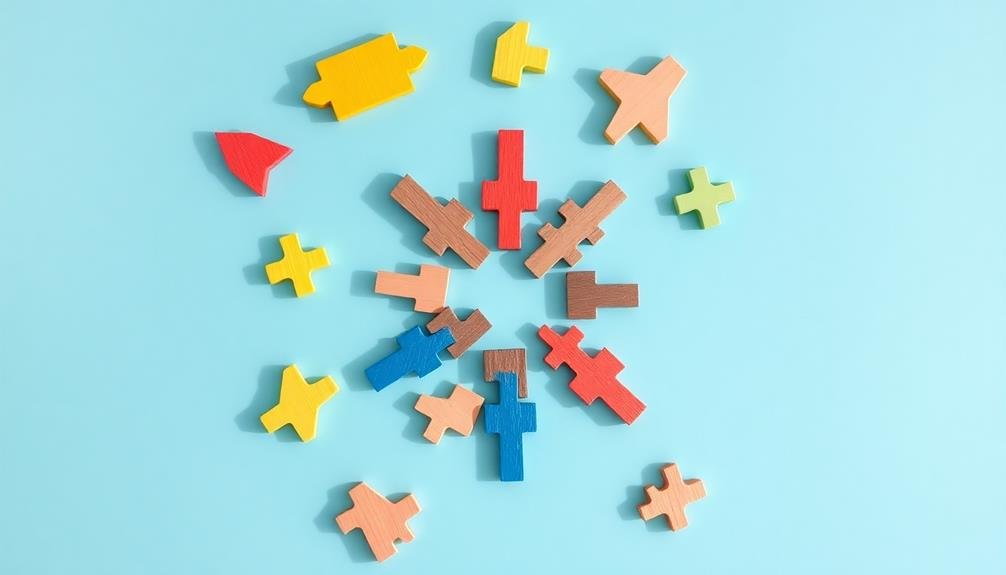
Ancient Chinese wisdom meets modern stress relief in the form of tangrams. These geometric puzzles, consisting of seven flat shapes, challenge you to recreate specific silhouettes. As you manipulate the pieces, you'll find your mind focusing on the task at hand, pushing away stress and anxiety.
Tangrams offer a meditative experience, allowing you to enter a state of flow. You'll improve your spatial awareness and problem-solving skills while enjoying a calming activity. The simplicity of the shapes belies the complexity of the puzzles, providing hours of engaging entertainment.
| Benefits of Tangrams | How They Help |
|---|---|
| Mental Focus | Reduces anxiety |
| Spatial Reasoning | Improves cognition |
| Problem-Solving | Boosts confidence |
| Creativity | Enhances imagination |
To get started, you can find tangram sets online or in toy stores. Many apps also offer digital versions, perfect for on-the-go stress relief. As you progress, you'll discover increasingly challenging patterns to recreate. Don't be discouraged if you can't solve a puzzle immediately – the journey is as important as the destination. Embrace the process, and let the ancient art of tangrams guide you to a more peaceful state of mind.
Rubik's Cube: Hands-On Anxiety Management
When you're feeling anxious, pick up a Rubik's Cube and let your hands guide you to calm.
As you twist and turn the cube, you'll engage in mindful, repetitive movements that can help soothe your nerves while developing problem-solving skills.
The tactile sensation of manipulating the cube provides a grounding experience, redirecting your focus from worry to the colorful puzzle in your hands.
Mindful Repetitive Movements
How can a simple toy become a powerful tool for managing anxiety? The answer lies in mindful repetitive movements. As you engage with puzzles like the Rubik's Cube, you're not just solving a problem; you're creating a rhythmic, meditative experience that can calm your mind and reduce stress.
Mindful repetitive movements offer several benefits for anxiety management:
- They provide a focal point for your attention, drawing it away from anxious thoughts.
- The repetitive nature of the movements can induce a state of flow, promoting relaxation.
- Physical engagement with an object grounds you in the present moment.
- Achieving small successes boosts confidence and reduces anxiety.
When you're feeling overwhelmed, try incorporating mindful repetitive movements into your routine. It doesn't have to be a Rubik's Cube; any puzzle or object that requires rhythmic manipulation can work.
Focus on the sensation of the object in your hands, the sound it makes as you move it, and the visual patterns it creates. By fully immersing yourself in these sensory experiences, you'll find your anxiety beginning to ebb away, replaced by a sense of calm focus.
Problem-Solving Skill Development
Beyond its calming effects, the Rubik's Cube offers a powerful way to develop problem-solving skills while managing anxiety. As you work on solving the puzzle, you're engaging in a process that mimics real-life problem-solving scenarios. You'll learn to break down complex issues into manageable steps, a skill that's invaluable when dealing with anxiety-inducing situations.
The cube challenges you to think critically and develop strategies. You'll find yourself analyzing patterns, making decisions, and adjusting your approach based on results. This process strengthens your cognitive flexibility, helping you adapt to changing circumstances more easily in your daily life.
Moreover, the Rubik's Cube teaches persistence. You'll face moments of frustration, but as you continue to practice, you'll experience the satisfaction of overcoming obstacles. This builds resilience, an essential trait for managing stress and anxiety.
As you improve, you'll gain confidence in your problem-solving abilities. This newfound self-assurance can spill over into other areas of your life, helping you approach challenges with a calmer, more composed mindset.
The Rubik's Cube isn't just a toy; it's a tool for personal growth and anxiety management.
Tactile Sensory Engagement
The Rubik's Cube's tactile nature offers a unique form of sensory engagement that can markedly reduce anxiety. As you manipulate the cube, your fingers interact with its smooth surfaces and satisfying clicks, creating a physical connection that grounds you in the present moment. This hands-on experience diverts your focus from stressors, allowing your mind to reset and relax.
The cube's tactile benefits extend beyond mere distraction:
- It provides a rhythmic, repetitive motion that can be soothing.
- The physical act of solving engages multiple senses simultaneously.
- It offers a tangible sense of progress as you work towards a solution.
- The cube's compact size makes it a portable stress-relief tool.
You'll find that regularly engaging with a Rubik's Cube can improve your fine motor skills and hand-eye coordination.
As you become more proficient, you may notice a boost in your overall dexterity and spatial awareness. The cube's versatility allows you to tailor your engagement level, from casual fidgeting to intense problem-solving, making it an adaptable tool for managing stress in various situations.
Word Searches: Letter-Based Relaxation
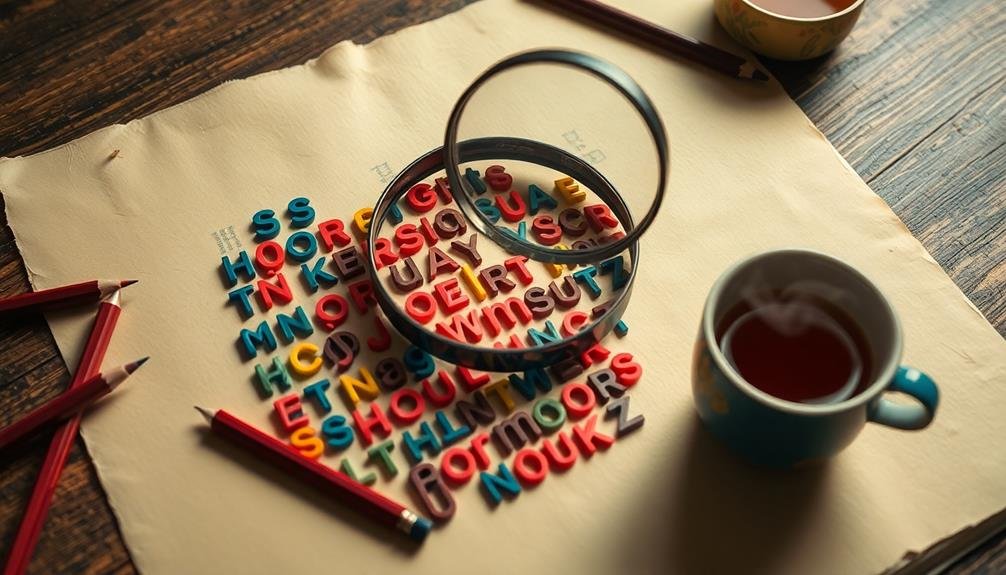
Word searches offer a soothing escape from daily stressors, allowing you to immerse yourself in a sea of letters. As you scan the grid, your mind shifts focus from worries to the task at hand. This simple yet engaging activity can help reduce anxiety and promote mindfulness.
To maximize the stress-busting benefits of word searches, try these tips:
- Choose themes that interest you, making the puzzle more enjoyable.
- Set a comfortable pace; there's no need to rush.
- Use a highlighter or colored pencil to mark found words, adding a visual element.
- Challenge yourself with increasingly difficult puzzles as your skills improve.
Here's a quick guide to word search difficulty levels:
| Difficulty | Grid Size | Word Direction | Hidden Words |
|---|---|---|---|
| Beginner | 8×8 | Horizontal | 5-10 |
| Easy | 10×10 | Horizontal, Vertical | 10-15 |
| Medium | 15×15 | All directions | 15-25 |
| Hard | 20×20 | All directions | 25-40 |
| Expert | 25×25+ | All directions, backwards | 40+ |
Logic Puzzles: Analytical Anxiety Reduction
Engaging your analytical mind can be a powerful tool for reducing anxiety. Logic puzzles offer a structured approach to problem-solving that can help shift your focus away from stress-inducing thoughts. As you work through these brain teasers, you'll find yourself fully immersed in the challenge, leaving little room for worry.
Logic puzzles come in various forms, each offering unique benefits:
- Sudoku: Improves concentration and pattern recognition
- Crosswords: Enhances vocabulary and general knowledge
- Riddles: Boosts creative thinking and lateral problem-solving
- Grid-based logic puzzles: Develops deductive reasoning skills
When you tackle these puzzles, you're not just passing time; you're actively rewiring your brain to approach problems more systematically. This skill can translate to real-life situations, helping you break down complex issues into manageable parts.
Start with simpler puzzles and gradually increase the difficulty as you build confidence. You'll likely find that the sense of accomplishment from solving these puzzles provides a natural mood boost.
Maze Books: Pathways to Peace
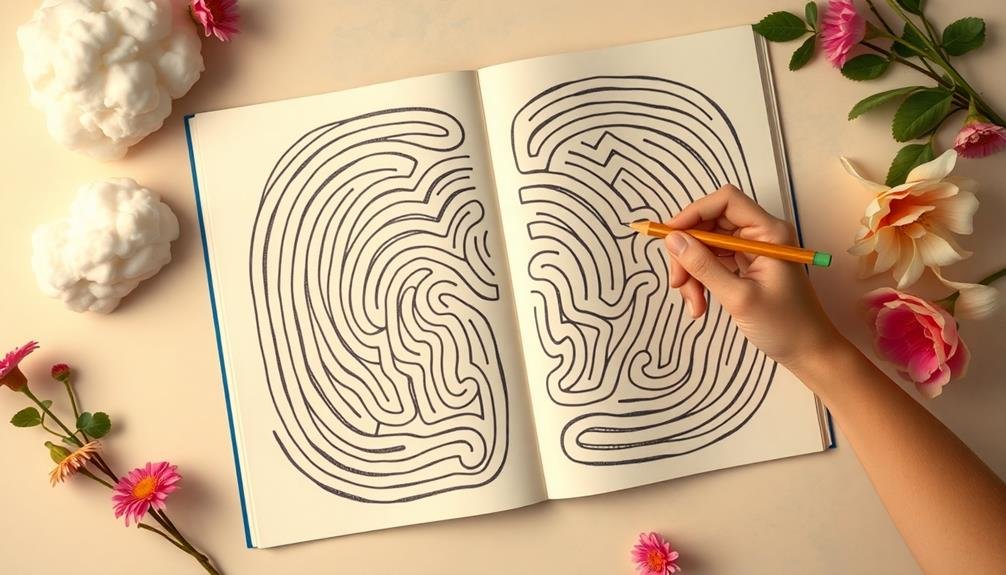
Countless maze enthusiasts have discovered the calming effects of traversing intricate paper labyrinths. As you navigate these winding paths, you'll find your mind focusing solely on the task at hand, pushing away stress and anxiety.
Maze books offer a portable, accessible way to engage in this meditative activity anywhere, anytime. You'll find a wide variety of maze types to suit your preferences. Traditional mazes challenge you to find a path from start to finish, while more complex designs may involve multiple solutions or hidden objects. Some books feature 3D mazes that add depth and perspective to the puzzle-solving experience.
The act of tracing a path through a maze can be incredibly soothing. It requires concentration but not intense mental strain, allowing your mind to enter a state of flow. This focused attention can help reduce cortisol levels and promote relaxation.
To maximize the stress-busting benefits of maze books, try incorporating them into your daily routine. Spend a few minutes solving mazes during your lunch break or before bed to unwind. You'll likely notice improvements in your focus, patience, and overall sense of calm.
3D Puzzles: Spatial Serenity
Beyond the flat world of mazes, 3D puzzles offer a unique form of stress relief. These spatial challenges engage your mind and hands, drawing your focus away from anxieties and into a world of depth and dimension. As you piece together intricate structures, you'll find your worries fading into the background.
3D puzzles come in various forms, each providing its own blend of difficulty and satisfaction:
- Wooden brain teasers
- Metal disentanglement puzzles
- Plastic interlocking cubes
- Architectural model kits
You'll discover that solving these puzzles isn't just about finding the right pieces; it's about understanding spatial relationships and developing problem-solving strategies. This mental exercise can be incredibly calming, as it requires your full attention and leaves little room for stressful thoughts.
As you progress, you'll likely notice improvements in your spatial reasoning and fine motor skills. The sense of accomplishment you'll feel upon completing a 3D puzzle can boost your confidence and provide a welcome distraction from daily stressors.
Whether you're a beginner or an expert, there's a 3D puzzle out there that can help you find your spatial serenity.
Coloring Puzzles: Creative Calm
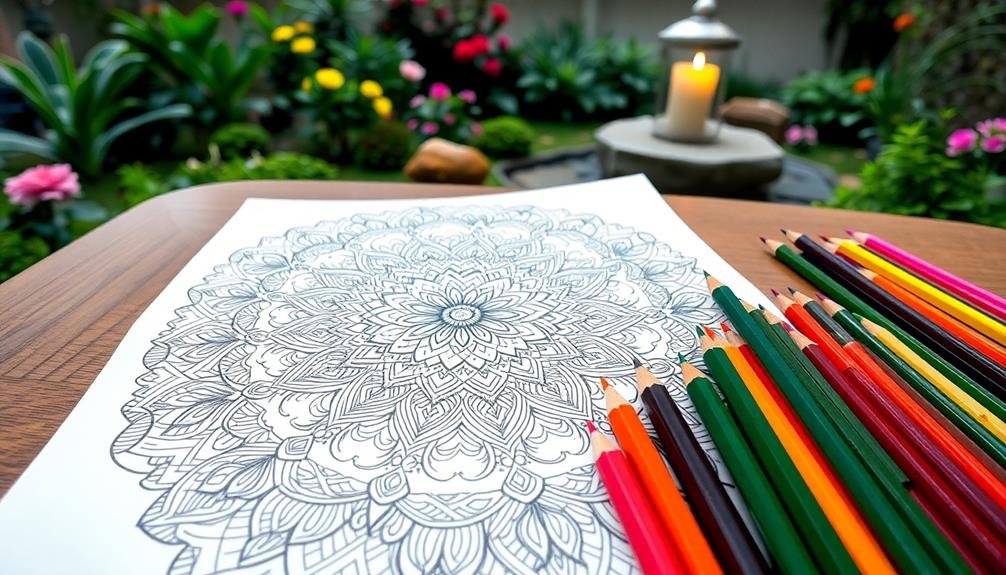
Release your inner artist with coloring puzzles, a creative avenue for stress relief. These intricate designs offer a meditative experience, allowing you to focus on the present moment and let go of daily worries. As you fill in the patterns with vibrant hues, you'll find your mind quieting and tension melting away.
Coloring puzzles come in various themes, from mandalas to nature scenes, catering to different preferences. You'll find options ranging from simple designs for beginners to complex patterns for experienced colorists. The act of choosing colors and bringing life to black-and-white outlines engages your creative side, promoting a sense of accomplishment and joy.
To get started, select high-quality coloring books or printable pages, and invest in a set of colored pencils, markers, or gel pens. Create a calm environment, perhaps with soft background music, and set aside dedicated time for your coloring sessions.
Don't worry about perfection; instead, enjoy the process and let your imagination guide you. As you develop this habit, you'll notice improvements in your mood, focus, and overall stress levels.
Digital Puzzles: Tech-Based Tranquility
While coloring puzzles offer a tactile experience, digital puzzles bring stress relief to your fingertips through modern technology. Your smartphone or tablet can become a portal to tranquility with a vast array of puzzle apps designed to engage your mind and soothe your nerves. From classic crosswords and sudoku to innovative new games, you'll find endless options to suit your preferences.
Digital puzzles offer unique advantages:
- Accessibility: Carry hundreds of puzzles in your pocket
- Customization: Adjust difficulty levels to match your mood
- Progress tracking: Monitor your improvement over time
- Social features: Compete with friends or join online communities
As you immerse yourself in the world of digital puzzles, you'll discover how they can help you unwind during your commute, lunch break, or before bed.
Many apps incorporate calming visuals and soothing soundtracks, enhancing the relaxation experience. Whether you're solving intricate logic problems or arranging colorful patterns, these tech-based puzzles provide a welcome distraction from daily stressors.
Frequently Asked Questions
How Long Should I Spend on Puzzles Daily for Maximum Stress Relief?
You'll benefit most from spending 15-30 minutes daily on puzzles for stress relief. However, don't pressure yourself with strict time limits. Listen to your body and mind, and adjust your puzzle time based on your stress levels and enjoyment.
Can Puzzle-Solving Become Addictive or Increase Anxiety in Some Individuals?
Yes, you can become addicted to puzzle-solving. It may increase anxiety if you're overly competitive or perfectionist. You'll need to monitor your habits and guarantee puzzles remain a relaxing activity rather than a source of stress.
Are There Age Restrictions for Different Types of Stress-Busting Puzzles?
You'll find most stress-busting puzzles don't have strict age restrictions. However, puzzle difficulty often increases with age groups. For young children, simpler puzzles are recommended. Always check product labels for specific age recommendations when buying puzzles.
How Do I Choose the Right Difficulty Level for Optimal Stress Reduction?
Start with easier puzzles that you can solve quickly. As you gain confidence, gradually increase the difficulty. Choose a level that challenges you without causing frustration. You'll find the sweet spot for ideal stress reduction through experimentation.
Can Solving Puzzles Replace Professional Therapy for Anxiety and Stress Management?
While puzzles can help manage stress, they can't replace professional therapy for anxiety. You shouldn't rely solely on them for mental health treatment. Instead, use puzzles as a complementary tool alongside professional help for best results.
In Summary
You've now got a toolbox of puzzles to combat stress and anxiety. Whether you prefer the tactile satisfaction of jigsaw pieces, the mental challenge of Sudoku, or the creative outlet of coloring puzzles, there's something for everyone. Don't underestimate the power of these simple activities to calm your mind and improve your focus. Next time you're feeling overwhelmed, reach for a puzzle and give your brain a much-needed break from worry.

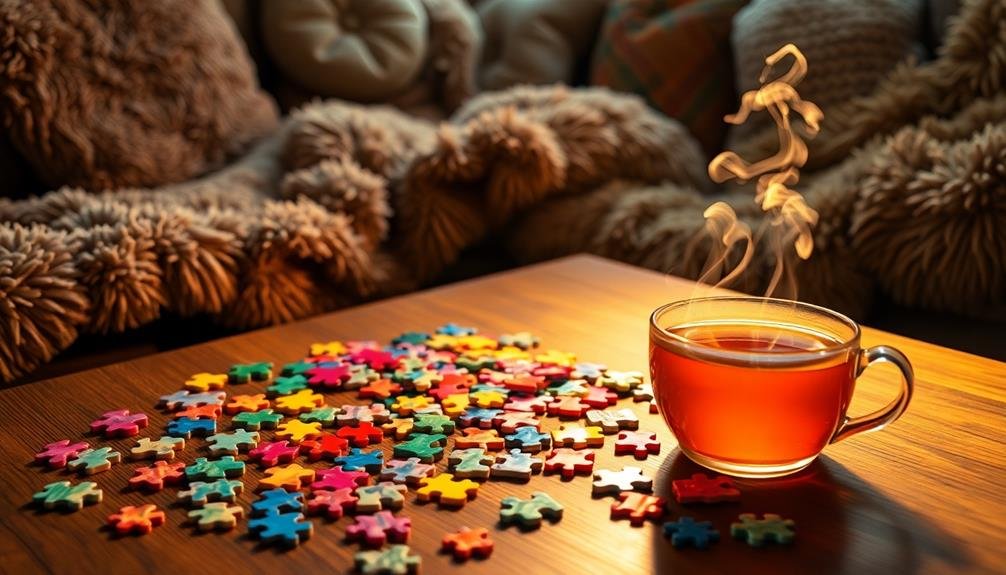
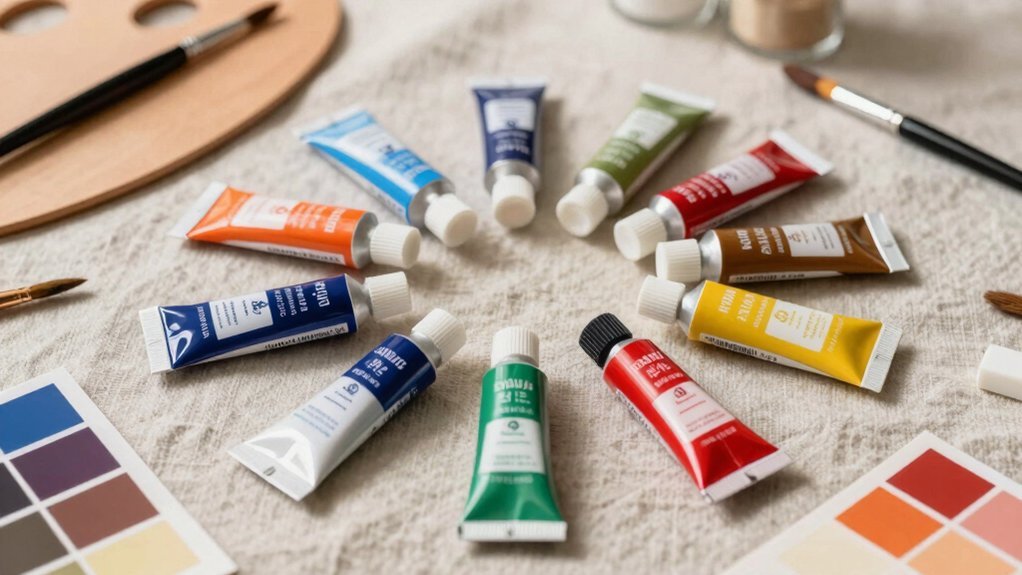
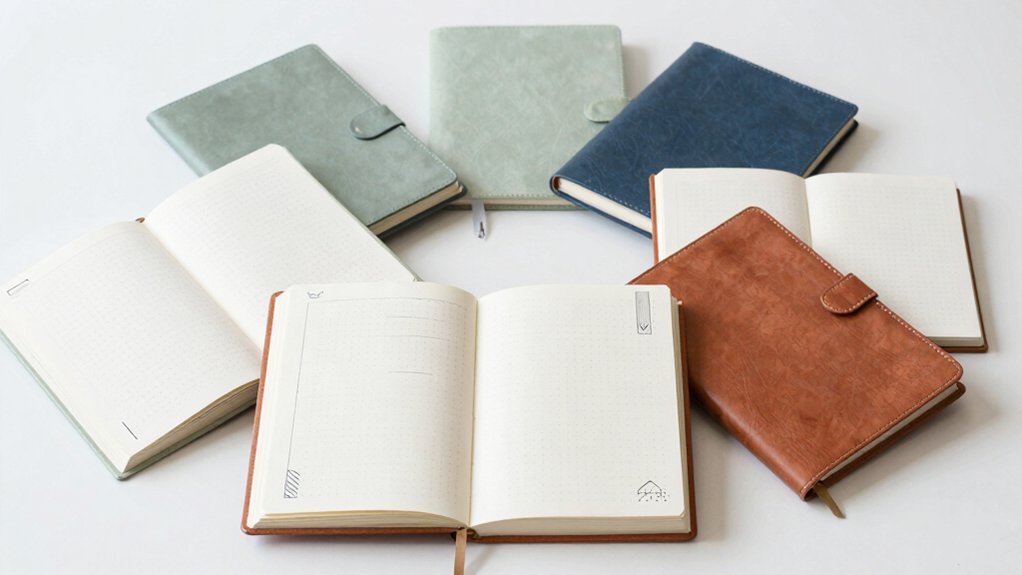
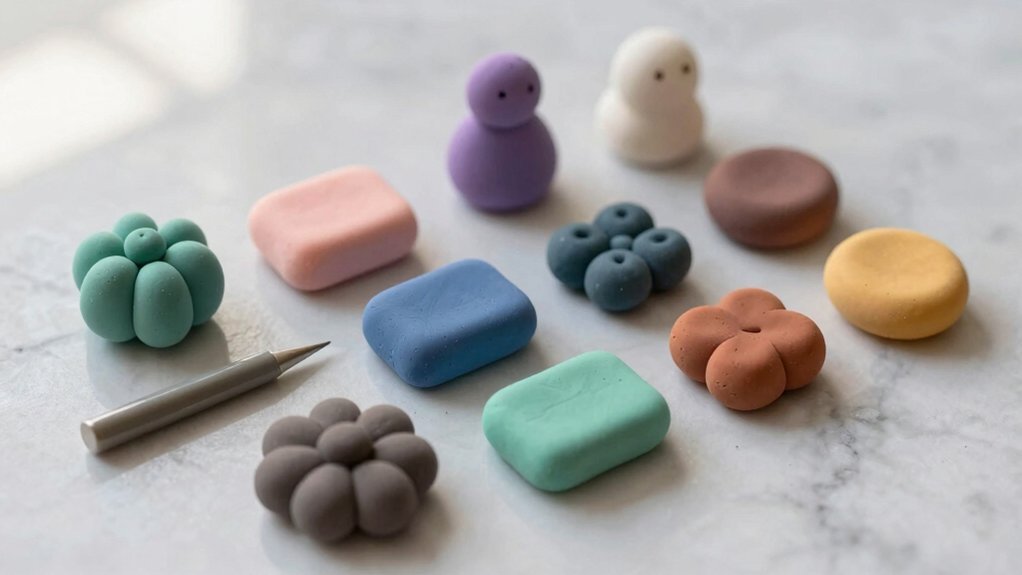
Leave a Reply